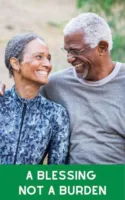‘Dad, I’ve asked you before: please don’t take out the dirt. It’s my job.’
This, you’ll agree, is a bizarre request from a son to a dad. Think about the order of things and you’ll soon realise it is counter-intuitive; had the roles been conventional, it would have been a dad scolding a son for not failing to take out the trash.
I was that son. A mommy’s boy. That bad habit may have easily continued when I persuaded my parents to live with me as a bachelor 18 years ago. Sixteen of those 18 years have been as a married man to a wife from a very different cultural background. The difference was that where my wife was from, children don’t usually take in their elderly parents to live with them. It is surprising then that my wife is closer to my parents than even I am.
Elsewhere, looking after your parents or giving back is sometimes regarded as ‘black tax’. But for us, it’s more blessing than burden. My parents Achmat and Aleweya Abarder were both born in 1943 and grew up in the starkness of post-World War II. As adults, they raised their four children as working-class parents – my mom a seamstress and my dad a truck driver – through the transitions of apartheid and then a free South Africa. The world was changing before their eyes and values they were taught as children has long since shifted.
When my parents were growing up, children were seen not heard. Now, at the dinner table, my children often discuss weighty issues with my wife and I and my parents present. Sexuality, questions about religion were taboo topics in my parents’ day. Luckily, Achmat and Aleweya are traditional enough to impart sound advice but not closed off to the realities of the times their grandchildren find themselves in.
Achmat is getting on a bit and often enters a room only to stop in his tracks, wondering what he had intended to do. Aleweya is the life of her ladies’ gym group and as hip as an 80-year-old can be.
My children are privileged to have their Mama and Papa as their caregivers after school. There is a hot meal waiting and help with homework. There is also a fair bit of bending of the parents’ rules when mom and dad are at work. It is their privilege, they’ll remind us.
Will my dad ever stop trying to put out the bins on refuse collection day, check the post box for letters or wash my car? Probably not if you go by the adage that you can’t teach an old dog new tricks. But it is like a rite of passage and the pull and the push of the role of parent and child switching.
I can never repay Achmat and Aleweya for all they have done for me and continue to do for my family and me. Living with us and enjoying the twilight of their lives is our small gift towards trying to repay this debt.
Tell us: what role do older people play in your community?



